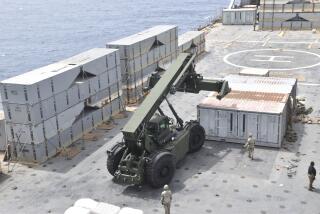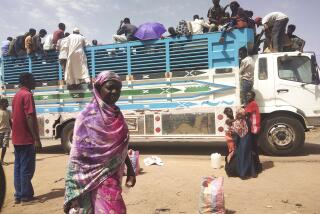U.N. Announces Plan to Hike Somali Relief : Africa: But officials say success depends on gangs and warlords allowing unimpeded shipments out of port to countryside.
NAIROBI, Kenya — The United Nations on Saturday announced a major initiative to increase the amount of relief food, agricultural stocks and medical care in famine-stricken Somalia over the next three months.
But U.N. officials, speaking here after a two-day fact-finding trip to Somalia, acknowledged that the program’s success still depends on the cooperation of the country’s warlords and armed gangs in permitting unimpeded movement of supplies out of the key port of Mogadishu and into the countryside. Little of that cooperation has yet been evident.
Moreover, much of the “additional” food to be delivered to Somalia as part of the U.N. program has already been pledged by such donors as the United States and would have been available for Somalia relief in any case.
The U.N. program includes delivery of 100,000 tons of relief food, seeds to revive agricultural production, and blankets and clothes to ward off the effects of the imminent rainy season.
In addition, UNICEF will undertake to immunize 1 million Somali children--75% of all children in the country--against measles and other childhood diseases. Other U.N. agencies will attempt to re-establish development projects throughout the country to begin building for a post-famine Somalia. Several U.N. agencies that have had no presence in Somalia for nearly two years, including the World Health Organization and the Food and Agriculture Organization, will establish offices there.
“We must give the Somali people a signal of hope by helping them to build up their institutions and infrastructures,” said Jan Eliasson, the undersecretary general for humanitarian affairs, at a news conference here.
Eliasson, who assumed his post March 1, was making his first visit to Somalia, which has been described as the world’s worst humanitarian crisis. More than 1.5 million Somalis, out of a total population of about 6 million, face death by starvation after years of drought and a 19-month civil war.
Eliasson and other U.N. officials on the trip did warn that the program could easily collapse if Somalia’s atmosphere of near-total anarchy does not quickly ease.
“If numerous relief personnel are killed in the next two weeks, that’s an obvious difficulty,” said UNICEF director James Grant. He added another caveat: The program depends on “some improvement of the security situation.”
The security question remains wide open right now. The first 60 of 500 Pakistani troops assigned to safeguard relief shipments at Mogadishu’s port and airport are due to arrive Monday. Although Eliasson and his companions expressed confidence that their deployment will lesson violence and tensions at the port, many other relief officials and workers on the scene fear that they could exacerbate the chaos. Mogadishu’s population includes as many as 40,000 gunmen. Many of these are responsible to no leader, and most of them treat relief supplies as the closest thing to currency, free for the taking.
The port has been closed to incoming relief freighters since 300 tons of food were stolen in an organized raid on Aug. 28.
Furthermore, the United Nations continues to be rebuffed by regional warlords in its attempt to negotiate an agreement on 3,000 more foreign troops to be deployed at sensitive points.
As for the 100,000 tons of relief food that is the core of the program, most of that was already slated for delivery to Somalia during the same three-month period. Tun Myat of the World Food Program said the WFP was originally planning to deliver 20,000 tons a month to Somalia and 10,000 tons to northern Somalia, a breakaway region.
Instead, all 30,000 tons will be delivered to Somalia proper in the next three months, Myat said.
More to Read
Sign up for Essential California
The most important California stories and recommendations in your inbox every morning.
You may occasionally receive promotional content from the Los Angeles Times.










